What history can be considered “ancient” is a matter of some debate, but since I’m pretty much known as “the military guy,” I reckon things by battles. To me, the “ancient world” begins with the scrap between the Egyptians and the Canaanites at Megiddo in the 15th century B.C., and ends with the lopsided victory of the Goths over the Romans at Adrianople in 378 A.D.
I love reading about the ancient world for the same reason I love reading great fantasy. The ancient world is familiar enough to feel real to me, but different enough to fill me with a sense of transportation and wonder. Even more, I feel the ancient world resonate in everything I do today. So much of my military service (everything from my haircut to my unit organization) was born in ancient times, concepts so solid and enduring that they persist today. Stories about the ancients are a way for me to tap the back of the wardrobe, and discover a portal to another world, one full of adventure and danger, to which I am inextricably linked, and which has been a part of me all along.
Try these five novels and see if you feel it too.
Clash of Eagles by Alan Smale
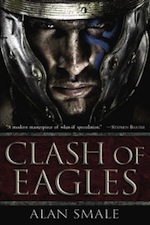 Smale’s alternate history is a work of speculative fiction, but one that is firmly rooted in impeccable research. Smale posits a world in which the Roman empire never fell, and follows the exploits of a legionary legate charged with finding gold in the new frontier of North America.
Smale’s alternate history is a work of speculative fiction, but one that is firmly rooted in impeccable research. Smale posits a world in which the Roman empire never fell, and follows the exploits of a legionary legate charged with finding gold in the new frontier of North America.
Smale’s research is impeccable, and he paints an incredible picture of life on the frontier for the Roman army, extrapolating flawlessly from the very Roman expeditionary life, which is very well documented by ancient standards. Smale gives equal attention to getting the mound building Native American cultures of the Northeast right, and readers can’t help but wind up with a detailed history lesson in the form of a story.
I, Claudius by Robert Graves
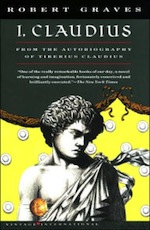 This one almost needs no introduction. Named by both the Modern Library and Time as one of the 100 best English-language novels of the 20th century, this incredible narrative account will give you a clear window into Rome under the Julio-Claudian dynasty.
This one almost needs no introduction. Named by both the Modern Library and Time as one of the 100 best English-language novels of the 20th century, this incredible narrative account will give you a clear window into Rome under the Julio-Claudian dynasty.
The book brilliantly sets up the political intrigue endemic to Roman patrician circles, and shows the “golden prison” that leaders often occupy. Graves’ Claudius is at once sympathetic and identifiable, as well as intimidating and powerful. Best part, if you love it (and you will), there’s a sequel, Claudius the God. That may be expected by modern readers who are accustomed to serials, but it’s unusual for a book published in 1935.
The Afghan Campaign by Steven Pressfield
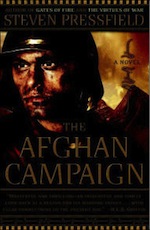 This account of an infantryman in Alexander the Great’s army is gripping and haunting and incredibly timely given the conflagrations that have gripped this same region even in the present day.
This account of an infantryman in Alexander the Great’s army is gripping and haunting and incredibly timely given the conflagrations that have gripped this same region even in the present day.
Pressfield is the undisputed master of ancient military writing. A Marine himself, he gets the timeless nature of the foot-soldier’s experience, and invokes it flawlessly in this deeply nuanced and sympathetic portrayal. This is as close as a person can come to marching with Alexander’s army.
The First Man in Rome by Colleen McCullough
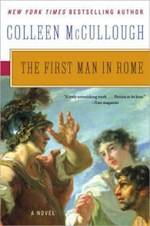 This book has a dated prose style that requires some plowing, but it’s worth the work for the incredibly compelling and well researched account of the genesis of Rome’s “Social War” that spelled the end of the Republic.
This book has a dated prose style that requires some plowing, but it’s worth the work for the incredibly compelling and well researched account of the genesis of Rome’s “Social War” that spelled the end of the Republic.
McCullough’s book is so respected that it’s often cited as a source in secondary scholarship. It’s particularly valuable for those seeking to understand daily life in ancient Rome, from the vaulted heights of the Capitoline Hill to the filth of the Subura, McCullough covers it all.
As with Graves, there’s more if you want it. The First man in Rome is the flagship offering in McCullough’s Masters of Rome series, a seven volume sweeping epic that will take you all the way from Marius and Sulla in 110 B.C. to Mark Antony and Cleopatra in 27 B.C.
The Last of the Wine by Mary Renault
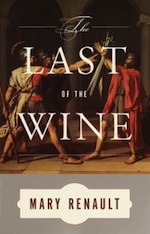 This gorgeous and elegiac exploration of the Peloponnesian War is remarkable for its honest and intimate treatment of homosexuality in Ancient Greece.
This gorgeous and elegiac exploration of the Peloponnesian War is remarkable for its honest and intimate treatment of homosexuality in Ancient Greece.
The book covers Athens defeat at the end of the war, and the installation of the Thirty Tyrants, the pro-Spartan oligarchs whose heavy-handed rule marked one of the earliest examples of successful insurgency. Renault covers this as well, depicting Thrasybulus in highly sympathetic tones.
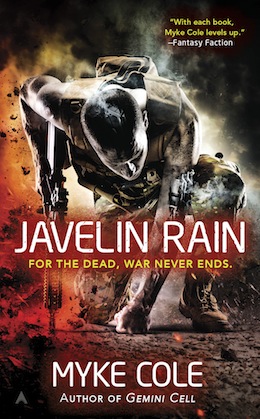 Myke Cole is the author of the military fantasy Shadow Ops series. His latest novel, Javelin Rain, will be published by Ace/Roc on March 29th. As a security contractor, government civilian and military officer, Myke Cole’s career has run the gamut from Counterterrorism to Cyber Warfare to Federal Law Enforcement. He’s done three tours in Iraq and was recalled to serve during the Deepwater Horizon oil spill. He’s also a huge history nerd and tabletop wargamer. You can often find him simulating ancient battles in 1/72 scale at the Metropolitan Wargamers Society in Park Slope.
Myke Cole is the author of the military fantasy Shadow Ops series. His latest novel, Javelin Rain, will be published by Ace/Roc on March 29th. As a security contractor, government civilian and military officer, Myke Cole’s career has run the gamut from Counterterrorism to Cyber Warfare to Federal Law Enforcement. He’s done three tours in Iraq and was recalled to serve during the Deepwater Horizon oil spill. He’s also a huge history nerd and tabletop wargamer. You can often find him simulating ancient battles in 1/72 scale at the Metropolitan Wargamers Society in Park Slope.










Some big, fat historical novels: Nicholas Guild’s The Assyrian/The Blood Star, which are about, yes, an Assyrian prince named Tiglath.
More Roman alternate history: Thomas Harlan’s four-book Oath of Empire series, again set in a world where Rome hadn’t fallen, with elder gods and huge battles and some spectacular battlefield magic.
Possibly pushing the envelope a little further, Samuel Delany’s Neveryon books.
One of my all-time favorites of this type is An Elephant for Aristotle by L. Sprague de Camp. It’s most impressive how he worked out just how one of Alexander the Great’s cavalry officers could have possibly led an elephant from India to Athens.
I’d give a whole-hearted recommendation to Francine Rivers’ ‘Mark of the Lion’ trilogy as well, with the side note that it is blatantly (Christian) religious.
So, if you’re really not into that, you won’t like it, but if you are, it’s a great spiritual story set in The Roman Empire, and I found the historical fiction to be wonderful. It really helped me wrap my head around the mindset in Rome. Great stuff.
A story worth reading even if it is set in not-quite-Ancient times (to borrow Mr. Cole’s delimiter of 378 CE) is L. Sprague de Camp’s Lest Darkness Fall, which does a good job depicting the Italian peninsula during Justinian’s “reconquest” and making the Goths the sympathetic figures, not the “invading” Byzantines.
Oh, oh, oh – Daughter of Troy by Dave Duncan under a female nom de plume Sarah Franklin – a first person perspective on the Trojan War by Briseis, a princess of the Troiad taken as a concubine prize by Achilles. Read it.
If nothing else, it made me look up what the Troiad was. It’s pretty obvious, in retrospect.
No love for Gene Wolfe’s Soldier… series? I’m married to the chair of classics at a major east coast university, so my ancient reading has a pretty high bar to clear if I’m not to get side-eye at the dinner table, but Gene Wolfe clears it handily.
Face it – The King Must Die. Shortly followed by The Bull From the Sea.
Mary Renault sets a pretty high standard with her version of Theseus’ life. Of course the Cretans held most of the East Mediterranean in thrall. Of course the Kentaurs were a folk memory of the Neandertals. Of course the Amazons were … really tragic it is, the way the story of Hippolytos ended …
Michael Livingston’s THE SHARDS OF HEAVEN, set in the period following Julius Ceasar’s assassination, with powerful artifacts wrapped up in Octavian’s quest to unite and conquer the Roman Mediterranean world.
Gore Vidal’s Creation and Julian are both very good for historical fiction. Creation follows a Greek born, Persian raised grandson of Zoroaster as he acts as an emissary and diplomat for Kings Darius and Xerxes.
And Julian tells the story of the last pagan emperor of Rome as it transitions into the Holy Roman Empire after the death of Constantine.
May I suggest a companion piece to this article, covering five notable non-fiction books abut the ancient world? I’m thinking books useful not just to fans and students of ancient times, but useful and accessible to writers. Lionel Casson’s The Ancient Mariners would be a good start to such a list.
@bruce-arthurs: I love that idea! My suggestion would be Great Cities of the Ancient World by L. Sprague de Camp.
(And I love the Casson book.)
Claudius the God isn’t so much a sequel as it is the second half of the book, which was probably a publishing decision. Graves has written some other books of interest, most notably Count Belisarius, about a general who commanded with industry and ingenuity in the service of Justinian.
I’m fond of JR Hamilton’s Alexander the Great, though I don’t know if it’s been superseded by more recent research.
Everything I’ve seen about Clash of Eagles makes it seem like so much wasted potential.
For ancient world stories, try the David Drake/Eric Flint Belisarius series. Then go to David Drake’s The General series (also about Belisarius, but using stand-in characters in a sci-fi setting). Check out Ranks of Bronze for a bit of classical Roman legion fun.
Once you’re done with all of that, go full non-fiction and grab Warren Treadgold’s History of the Byzantine State and Society.
Gillian Bradshaw wrote a few. I feel that the characters, much like McCullough’s and Penman’s, are a bit over romanticized, but its good storytelling, with a decent chance to learn something from her research, if you are a layman like me. Beacon at Alexandria and Horses of Heaven stood out as the best years back when I read them at the school library, but maybe they wouldn’t hold up well on a reread.
Uh, these are all European. A better fit would be ‘Five Books About the Ancient European World’ – nothing wrong with ancient Europe, but that’s more truth in advertising.
@15: I loved “Beacon at Alexandria.” That is, I liked all Bradshaw’s books, but that one was one of my favorites. I’m also particularly fond of “Island of Ghosts” — Sarmatian legions in Britain! — and of “Render Unto Caesar” — sometimes the law really is mightier than the, well, mighty.
4000 Years Ago would be another possible nonfiction entry.
Household Gods by Judith Tarr and Harry Turtledove
I would highly recommend Paul Kearney’s “The Macht” trilogy starting with “The Ten Thousand”, a brilliant retelling of Xenophon’s Anabasis.
I enjoy Lindsey Davis’ series about Marcus Didius Falco, a PI (they don’t really have that term in Ancient Rome) who takes on cases the Roman Senate needs looked into, but won’t sully their hands with. He also has the hots for Julia, a Senator’s daughter that he needs to be even more circumspect about wooing. First one is Silver Pigs, about tin mining in Cornwall and smuggling.
For kids, I suggest the Roman Mysteries series by Caroline Lawrence, about 4 young friends. One is a free Jew, one is a highborn Senator’s daughter and another her slave, and one a mute stable boy who travel about together across the Roman empire, from North Africa to Byzantium, Gaul, and Britannia, and up and down the Italian peninsula.
For something completely different, you might check out the prehistoric North America series by the Gears, a husband and wife team who write about the various cultures across Mesoamerica and what will eventually become the US.
While Mary Renault, Steven Pressfield, and Robert Graves are perfect here-WHERE is STEVEN SAYLOR?! i follow his work religiously and he is ACCURATE, more so than Davis! Where is Michael Ford, David Wishart and Gary Corby, Margaret Doody, Judith Tarr and Pauline Gedge? SO MANY fabulous writers out there that you are MISSING!
A series I have really been enjoying is R.W. Peake’s “Marching With Caesar” series. These books are heavily battle and campaign weighted but also are quite historically accurate. The books follow the life and Legion career of Titus Pullus and, after him, his adopted nephew through the campaigns of Caesar. There are also a couple of alternate history books in which Caesar is not assassinated and continues his conquests into Asia. Good reading for anyone who enjoys Roman-era historical fiction.
Judith Tarr has quite a lot of novels set in the ancient world (including Egypt for those looking for something non-European).
Barry Hughart’s tales of an Ancient China That Never Was might not qualify here, but they’re amazing. Start with Bridge of Birds and be prepared to greedily devour the rest.
Books I have read that spring to mind are Valerio Massimo Manfredi’s “The Last Legion”, a story about a few Roman soldiers fleeing to Britannia in the attempt to protect the last emperor of Rome, taking also with them the sword of Julius aesar which in the end of the book will become the Sword in the Stone (a film was made after the book in 2007); and his “The Empire of Dragons”, also about a Roman officer who gets imprisoned while protecting his emperor and finds himself on a journey to then-unknown China. While they are not my favourite books, they are a decent enough read.
Snow Flower and the Secret Fan. China
My favorite historical fantasy is the “Latro” trilogy, (Soldier in the Mist, Soldier of Arête, and Soldier of Sidon), by the great Gene Wolfe. Wolfe’s invention of literary conceits that serve as lenses through which we get a deep emotional view of the worlds he creates is unique and unparalleled in modern fiction. Nowhere is this gift on greater display than in the story of Latro the Roman mercenary who while fighting in Greece, suffers a head injury that deprives him of his short-term memory but gifts (or curses) him with the ability to interact with supernatural creatures and forces that invisibly inhabit the ancient landscape.
The further conceit this engenders is the form of the narrative: Latro’s daily journal, without which he literally loses himself. Because Latro cannot take anything for granted and must view the world with fresh eyes everyday, so do we view the ancient world through his eyes. Wonder, terror, awe, and surprise are his constant companions. Whether or not the gods, elementals, and demons he encounters are products of his own damaged psyche is left deliberately ambiguous, but the literary effect is that we feel the force of these powers in the ancient world in a way that no “world-building” attention to historical detail could achieve. Wolfe gives a window into the psyche, the unconscious of the ancient world.
I call that genius.
Harry Turtledove (under the name Turteltaub) has some entertaining YA books about two young Greek traders sailing their ship around the Mediterranean in years after the death of Alexander the Great.
Steven Pressfield’s “Gates of Fire,” “Imperium” by Robert Harris, and how could Bernard Cornwell NOT have made a list of Historical Fiction? Anything from his Richard Sharpe series (of over 30 novels about a soldier in the Napoleonic Wars) and Thomas of Hookton books (about an archer in the Hundred Years War) to his latest Saxon Chronicles (The story of Uhtred of Bebbanburg, forced to fight on the side of King Alfred and the Christians he despises against the brutal and Pagan Vikings he so loves). Or Giles Kristian’s “Bloodeye,” Robert Low’s Oathsworn series, James Clavell’s “Shogun,” Simon Scarrow’s excellent Macro and Cato series, Conn Iggulden’s Ghengis Khan series, “The Conscience of the King” by Alfred Duggan. . . There’s so many books that the list above looks lacking.
On the subject of the incomparable Mary Renault, don’t forget The Persian Boy about Alexander the Great and his conquest of the known world. Amazing!
Also,I’ve recently discovered the prolific Christian Cameron, who writes wonderful series about the ancient world and has an ongoing series about Renaissance knighthood and chivalry . His works are fascinating, not least because he is a war reenactor, who, for example, has actually fought in full armor, and includes that element of ‘here’s what it really feels like’ in his fiction. He also writes fantasy under the name Miles Cameron and I highly recommend his Red Knight series set in a largely medieval world.